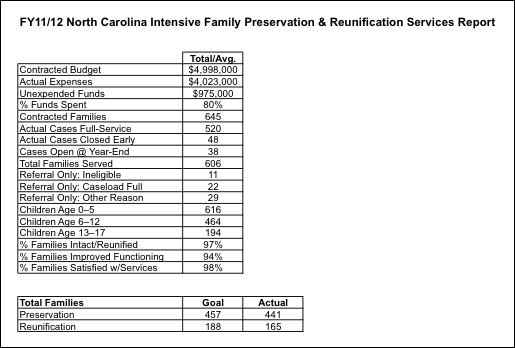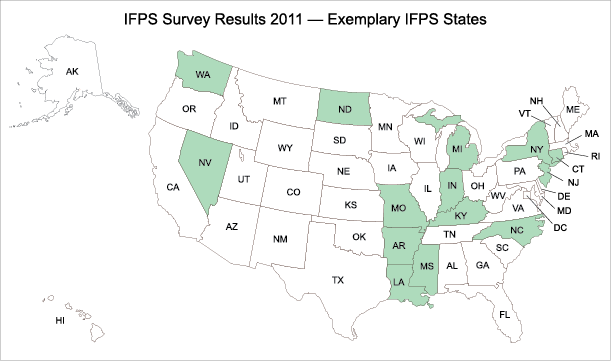Perhaps your agency is one of many that is on a July 1 to June 30 fiscal year. With the new fiscal year at hand, your agency may also be considering new programs.
How do you start from scratch to build an effective program?
Let’s look at how one state created an effective Intensive Family Preservation Services (IFPS) program.
Legislation
The legislative assembly of North Carolina enacted the Family Preservation Act in 1991. The legislation is only a few pages long but it sets forth the essential components of an effective IFPS model:
- child is at imminent risk of placement,
- families receive services for an average of four and maximum of six weeks,
- family preservation workers are available by phone and for visits 24/7, and
- the maximum caseload at one time is four families.
View the legislation here: http://bit.ly/10ARUBm
Request for Application/Proposal
With IFPS now firmly established in statute, the next step was to further define the program. A good source of information for establishing a program is the Request for Proposal (RFP) or Request for Application (RFA) issued by a government entity to solicit providers for a specific service.
The North Carolina Division of Social Services issued the most recent solicitation for IFPS in January of this year. We learn from this document that the state is awarding $3 million to be allocated among 11 regions of the state. The three-year contract will provide reimbursement to providers of $6,000 per family who completes services. We also learn that a master’s degree in social work is preferred for IFPS direct services workers and supervisors, and that they are required to take an initial six days of training. The bulk of the RFA describes the services that must be delivered and the expected outcomes.
View the RFA here: http://bit.ly/12XVxTu
Following submission of applications, a review committee scores each one. If there is more than a 10-point difference among reviewers, the application is pulled for further discussion and re-scored. Contracts are awarded for each region based on the highest-ranking application. Because awards are determined in this way, there is no guarantee that winning a contract in one RFA cycle will result in winning a contract in the next RFA cycle.
Tracking Results
How does North Carolina determine if the IFPS services are effective? One method is through a quarterly tracking report. Simple, yet informative, the report collects basic information on the:
- number of families served,
- number of families ineligible for services or opening not available,
- ages of children, and
- outcomes:
- percentage of families remaining together,
- improved family functioning, and
- family satisfaction with services.
At any point in time, the report provides a quick snapshot of IFPS.
Here is the most recent annual summary of their quarterly reports:

(Download the annual summary in PDF format: http://bit.ly/11B6sMA )
Special thanks to Michelle Reines, Program Consultant for Child Welfare Services, for providing information about North Carolina IFPS.
Other Resources
Here are some other resources for building and maintaining an effective IFPS program:
- Institute for Family Development — Homebuilders® Model
- National Family Preservation Network (NFPN) — Information, Training/Technical Assistance
E-mail: director@nfpn.org
_______________
Posted by Priscilla Martens, NFPN Executive Director

